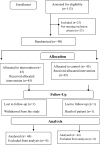The impact of an educational discharge program based on Orem's self-care model on lifestyle, hope, and treatment adherence in coronary angioplasty patients: a randomized controlled clinical trial
- PMID: 40065416
- PMCID: PMC11895282
- DOI: 10.1186/s13104-025-07164-9
The impact of an educational discharge program based on Orem's self-care model on lifestyle, hope, and treatment adherence in coronary angioplasty patients: a randomized controlled clinical trial
Abstract
Objective: Patient education at the time of discharge using models which aim to improve self-care behaviors can significantly contribute to patients' adoption of a healthy lifestyle and treatment adherence. This is a randomized controlled clinical trial with no blinding in which we tested two groups of intervention control. 90 patients having undergone coronary angioplasty were allocated to an intervention (N = 45) and a control group randomly (N = 45). Data were collected from January to October 2022. The data collection instruments comprised angioplasty patients' treatment adherence questionnaire, Walker's health-promoting lifestyle profile questionnaire, and Snyder's Hope Scale. Data analysis was performed using SPSS version 23. To analyze the data, we used descriptive statistics. Accordingly, inferential statistics applied included chi-square, independent-samples t-test, and repeated measures (ANOVA). Significance level was considered as p < 0.05.
Results: The mean scores of lifestyle, hope, and treatment adherence in the intervention group were significantly higher than those of the control group as measured immediately and three months after the intervention (p < 0.05). The study results revealed that using discharge program based on Orem's self-care model positively impacted the lifestyle, hope, and treatment adherence of patients having experienced coronary angioplasty.
Iranian registry of clinical trials: IRCT registration number: IRCT20190917044802N5.
Registration date: 17/7/2022.
Keywords: Discharge program; Education; Lifestyle; Patient; Self care; Treatment adherence.
© 2025. The Author(s).
Conflict of interest statement
Declarations. Ethics approval and consent to participate: This study was done based on the principles outlined in the revised Declaration of Helsinki. This internationally recognized statement provides ethical guidance for physicians and researchers conducting human subject research. Written informed consent was obtained from all the participants. Furthermore, the participants were explicitly informed about the measures taken to ensure anonymity and confidentiality of their data. For added ethical oversight, approval for the study was obtained from the Research Ethics Committees of Fasa University of Medical Sciences, Fars, Iran, with the code of IR.FUMS.REC.1401.035. All the research methods were performed following the principles of the Declaration of Helsinki. Consent for publication: Not applicable. Competing interests: The authors declare no competing interests.
Figures
References
-
- Sarrafzadegan N, Mohammadifard N. Cardiovascular disease in Iran in the last 40 years: prevalence, mortality, morbidity, challenges and strategies for cardiovascular prevention. 2019. - PubMed
-
- Emamgholipour S, Moeini S. Comparison of the economic burden between coronary artery bypass grafting and percutaneous coronary intervention at a One-Year Follow-up. Iran Heart J. 2022;23(1):106–11.
-
- Mäkikallio T, Holm NR, Lindsay M, et al. Percutaneous coronary angioplasty versus coronary artery bypass grafting in treatment of unprotected left main stenosis (NOBLE): a prospective, randomized, open-label, non-inferiority trial. Lancet. 2016;388(10061):2743–52. - PubMed
Publication types
MeSH terms
LinkOut - more resources
Full Text Sources
Research Materials


